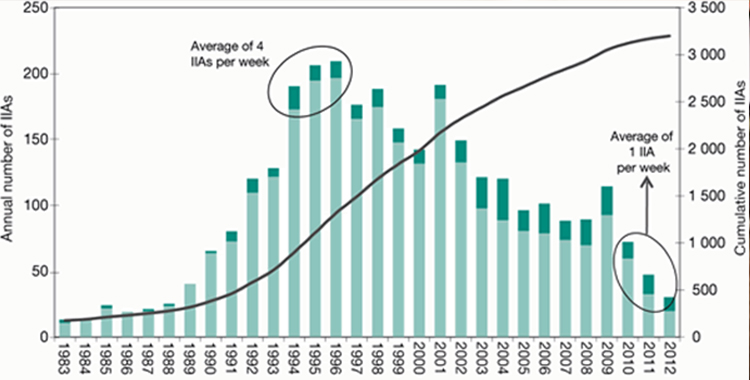
Bridging the Gap between Bilateral Investment Treaties (BITs) and Socio-Economic Development across the West African Sub Region, by Ama Asare Korang, ESQ *
- Jul 9, 2016
- 0 Comments
- INTRODUCTION
- WHAT ARE BITs?
- WHY BITs?
- Fair and Equitable Treatment (FET)
- Most Favored Nation Clauses:
- National Treatment Clauses
- Security Protection Clauses:
- Repatriation of Capital and Profit Clauses:
- Expropriation
- Dispute Resolution Clauses:
- DOES A BIT SECURE INVESTMENT?
- ECOWAS SUPPLEMENTARY ACT
- THE WAY FORWARD
- LOCAL CONTENT PROVISIONS:
- ANTI-BRIBERY AND CORRUPTION
- TECHNOLOGICAL TRANSFER PROVISIONS
- ENVIRONMENTAL AND HEALTH SAFETY ISSUES:
- DISPUTE RESOLUTION PROCEDURES
- CONCLUSION
#12
Abedi Pele
ABENA ACKAH VRS AGRICULTURAL DEVELOPMENT BANK
ACFTA
Act 987
Act 992
Act549
AfCTA
Africa
African Arbitrators
African Continental Free Trade Agreement
African sports
African Union
agency
airspace in Ghana
airspace safety
Amending Grounds of Appeal
Amendment of Grounds of Appeal
Anas
Announcements
Appealing Against Tax Assesments
Appeals in Ghana
arbitration
Arguing new grounds of appeal
Asamoah Gyan
aviation
Azumah Nelson
Bank of Ghana
Black Queens
Black stars of Ghana
Blackstars
Bukom Banku
Business
case law
Cashlite Agenda
CI 47
CIArb
Civil actions
Civil Procedure
civil procedure Ghana
Civil Procedure in Ghana
Collective Societies
Companies Act of Ghana 2019
Company law
CONTRACT LAW
conveyancing
Copyright in Ghana
Copyright infringement
Copyrights in Folklore
CORONA VIRUS
Corporate Governance
Corruption in sports
Court of Appeal
COVID-19
Cultural Elements and the Law
cyber crime
dede Ayew
details of sports in Ghana
Directorship
District Courts in Ghana
Diversity
Drone safety
Drone usage in Ghana
drones
Economic Development
Economic Digitisation
EMPLOYMENT LAW
Enforcement of awards
Equity
Finance
Financial Digitisation
financial laws
Fintech
Fintech in Ghana
fintech regulation
Fintech Revolution
Folklore
Folklore in Ghana
FORCE MAJEURE
Free Trade Agreement
Free Trade Area
FRUSTRATION
GHAMRO
Ghana
Ghana football
ghana football corruption
Ghana passes Fintech Law
Ghana Sports
Ghana Tourism Authority
Ghana Tourism Authority Uses Elements of GUDA video by Kirani
GRA
High Court
High Court (Civil Procedure) Rules 2004
Intellectual Property
international law
International Provisions on Folklore
International Trade Law
International Treaties
Intra-Regional Jurisdiction
Investments in Africa
Invoking Jurisdiction
IP regime in Ghanaian Folklore
Isaac Dogbe
John Doe
John Doe Orders
Jurisdiction of High Court
Jurisdiction of the District Court
Kirani AYAT
Kwasi Nyantakyi
Kwesi Appiah
Kwesi Nyantakyi
Law
lawful attorneys
Legal
Legal Deeds
Legislation
legislation in Ghana
Limitations of the District Courts' Jurisdiction
Michael Essian
Music Rights
NOVATION
Order 81
partners
Payment Systems and Services Act 2019
Power of Attorney
Power of Attorney Act 1998
Powers of a District Magistrate
Protection of Ethnic Expressions
Public law
Recovery of property
Regulating Fintechs in Ghana
Remedies in Public law
revocation of power of attorneys
RPAs in Ghana
Services
Sports in Ghana
Stephen Appiah
Tax Appeals
Tax Assessments
The District Court
The Rights of Music Right Holders in Ghana
tracing
Trade blocs
Trade law
Trade Liberalisation
trust
UAVs in Ghana
unknown offenders
Updates
Who owns Folklore
robertsmith
robertsmith


